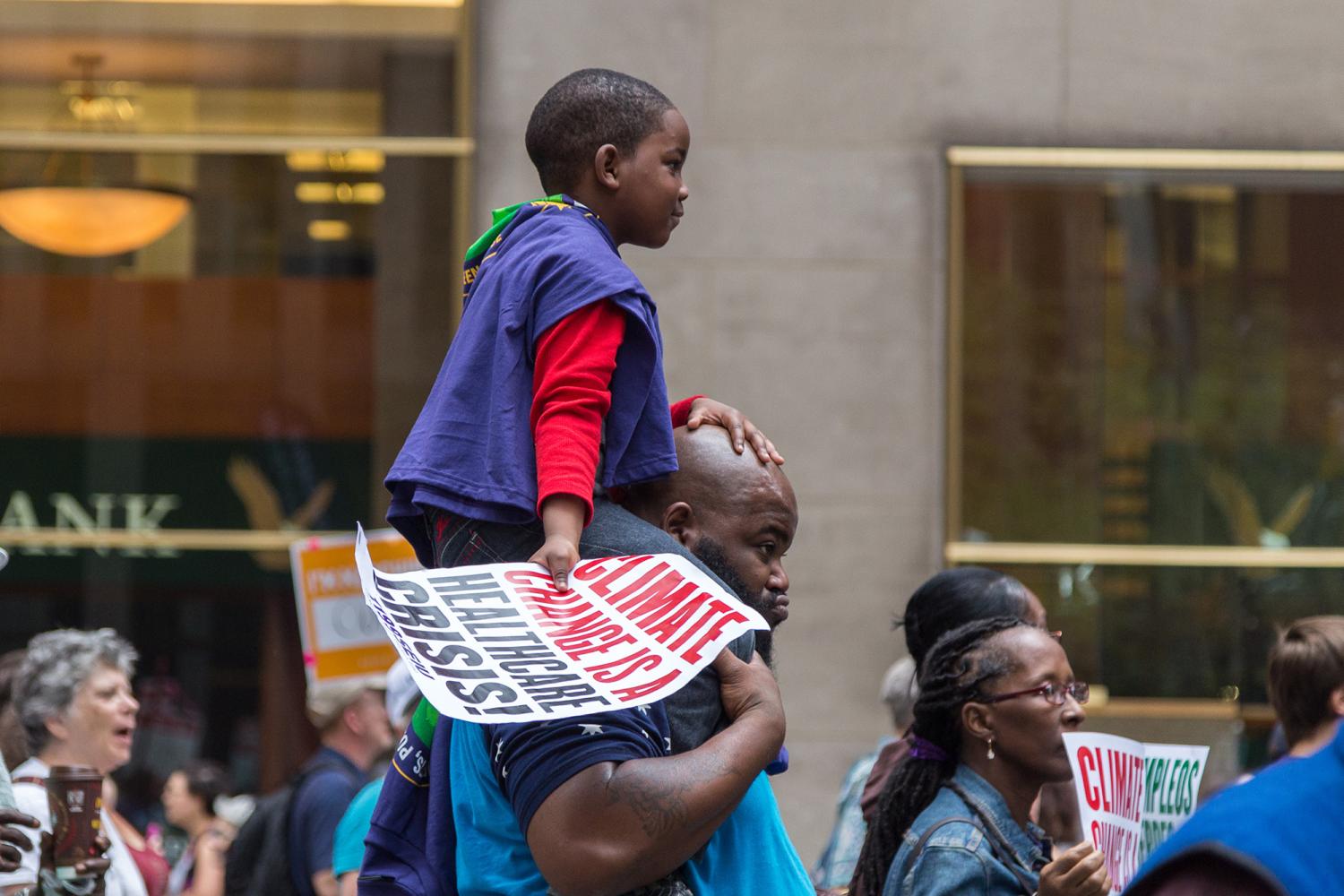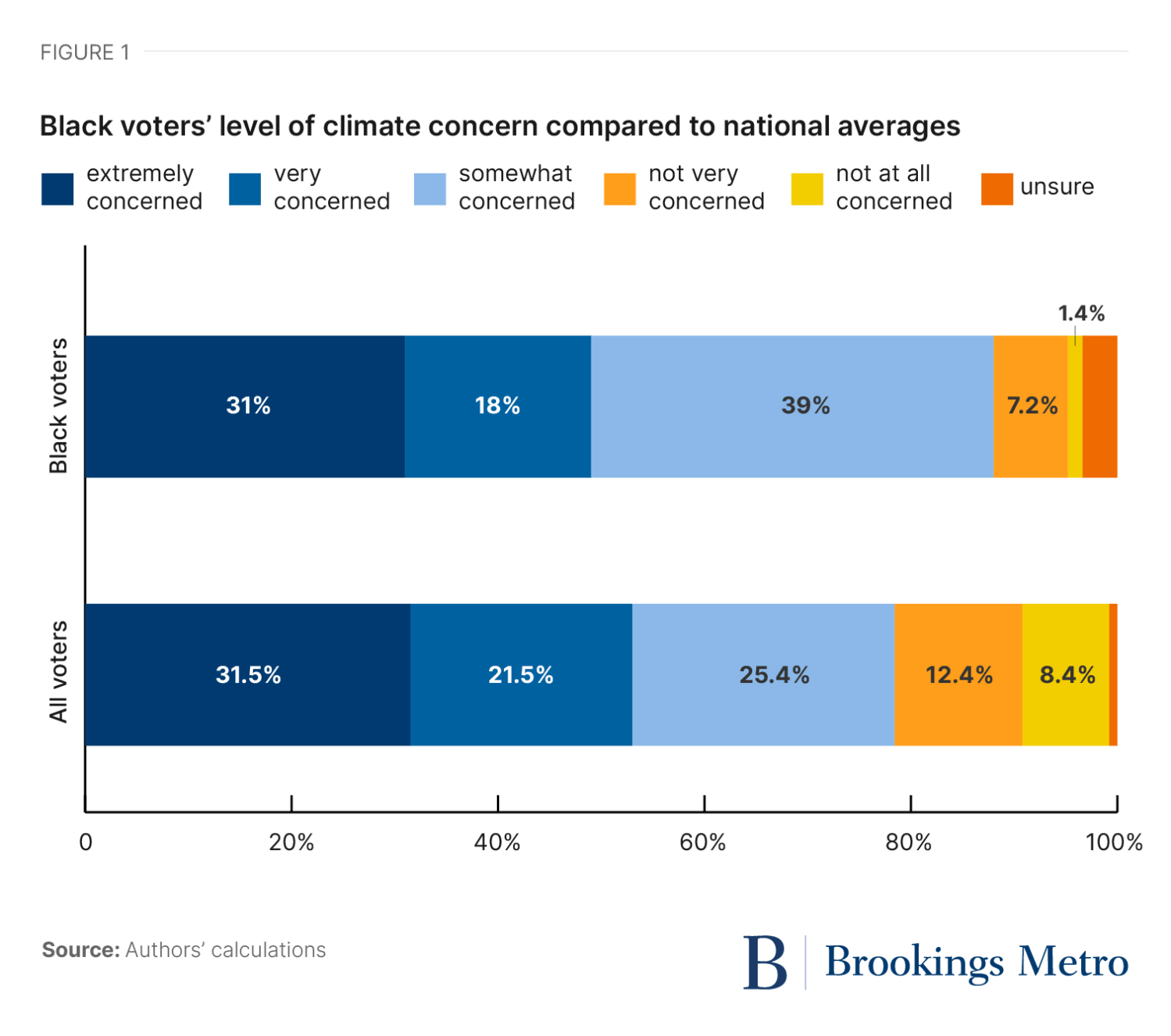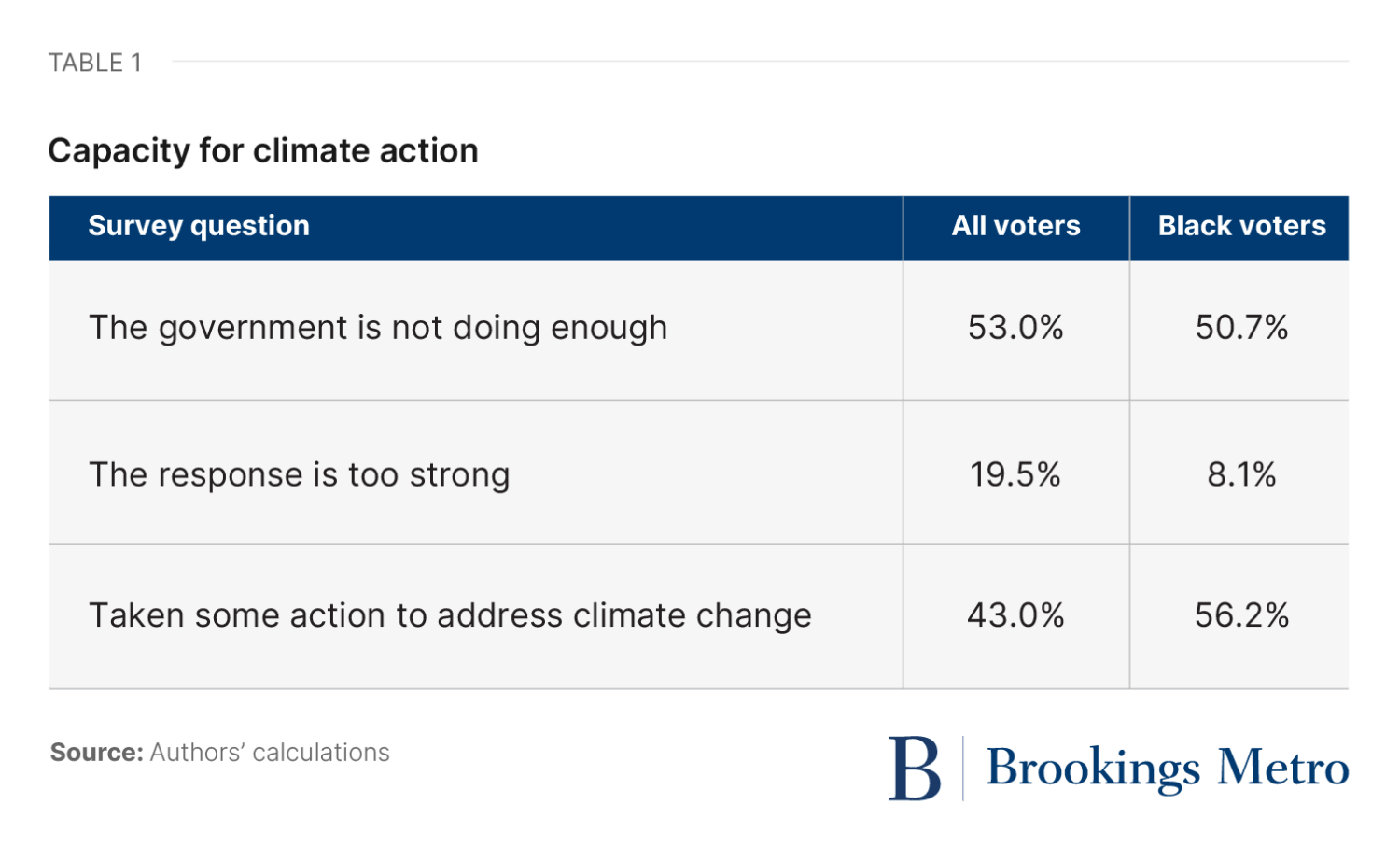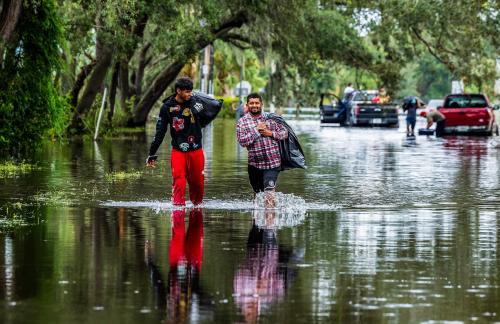In the U.S., climate change is one of the most politically divisive electoral issues. A recent survey revealed that only a slight majority of Americans, fluctuating around 54% since 2016, consider climate change a significant threat. That’s surprisingly low considering the frequency and severity of climate impacts in the U.S., with 71% of Americans reporting that their community had experienced extreme weather in 2022.
Part of the reason for this disconnect is that the design and communication of climate policy has failed to appeal to a wide voter base. Public opinion on climate change shapes climate policy, and as the U.S. becomes more racially diverse, understanding how climate concern differs along lines of race and ethnicity is crucial to target messaging for wider public engagement.
While national polling on climate change is relatively detailed—especially across political ideology, age, income, and gender—we’re still missing a core characteristic: race and ethnicity. Because of this gap, the “national perspective” has largely captured the preferences of white voters, who are over-represented in survey samples. Meanwhile, despite being one of the groups most impacted by climate change, few studies have examined Black voters’ preferences for climate change policies.
Our research provides evidence of substantial differences in Black voters’ preferences for climate policies. Drawing on modeling and survey data from Citizen Data, we find that, on average, Black voters are more concerned about climate change than the national average, less polarized, and more likely to take action to support climate policy. Our September 2023 poll indicates that for Black voters, climate change is a higher political concern than abortion and democracy. These results are aligned with other recent studies that found broadly similar results, including for Latino or Hispanic and Asian American voters.
These differences matter because they challenge the conventions of how we communicate and package climate change policies. Rather than appeal only to an “average” climate-concerned voter, this research provides the impetus for more nuanced messaging and design of climate policy, while being sensitive to the preferences and concerns of nonwhite voters.
By omitting race, ‘national’ polling on climate change can obscure the preferences of the most impacted
Race plays a role in shaping political views, yet it’s still infrequently used in national polls for policy preferences, including on climate change. Because public opinion shapes the design and structure of policy, the exclusion of how preferences vary along lines of racial identity—and its intersection with other factors such as age, income, education, geography, and political ideology—can bias policies toward the preferences of white Americans.
This bias is not unique to opinion polls on climate change. Data “invisibilization”—the tendency for data aggregation to erase the experiences of politically marginalized groups such as Native American, Latino or Hispanic, and rural voters—obstructs the equitable provision of public services such as health care, and biases policy responses.
For climate change policy, the invisibilization of nonwhite voters’ preferences can skew policies away from the concerns of the most impacted groups. The takeaway from most national surveys is that the typical “climate-concerned” voter—meaning somebody who believes global warming is happening and that it’s a serious threat, and supports climate policies—is young, Democrat-leaning, liberal, highly educated, wealthy, and likely female.
However, as our work will discuss and as other recent studies have indicated, this archetype is specific to white voters. The few studies of preferences by race and ethnicity have shown that climate is likely a less polarizing issue for voters of color. There appear to be greater levels of support for climate policies among voters of color irrespective of political ideology, gender, age, education, and income. Importantly, two of the factors that most determine national perspectives—income and age—appear to have a smaller effect on support among voters of color. While partisan affiliation is still highly associated with climate concern among voters of color (with Democratic voters substantially more likely to support climate policies), recent studies also indicate that Republican voters of color have rates of climate concern 4 to 13 percentage points higher than all Republican voters.
These differences are significant because communities of color are the most overburdened by climate impacts. Environmental Protection Agency (EPA) data shows that individuals who identify as Black or African American are “40% more likely than non-Black Americans and non-African Americans to currently live in areas with the highest projected increases in mortality rates due to climate-driven changes in extreme temperatures.” This overexposure and greater vulnerability to climate risk should be a motivating factor for policy to respond to the needs of these groups—especially at the local level, where most climate policy is implemented.
Understanding these distinctions is also crucial to climate communication—a core part of developing the wide political support for climate action that the U.S desperately needs. The nation’s political division on climate policy has cost American lives and livelihoods. An estimated 14 million Americans live in counties that exceed the EPA’s threshold level of concern for cancer risk due to oil and gas pollution, and in 2023, the U.S. had over 24 confirmed climate disasters exceeding $1 billion each. Understanding how preferences vary at the intersection of race and other demographic and ideological factors can help to refine climate communication across more diverse voters and aid the design of policies to address these groups’ unique needs.
Black voters are more concerned about climate change than the national average
In September 2023, Citizen Data conducted a poll with a sample size of 1,001 registered voters, weighted to be broadly representative of a cross section of American voters (3.1% margin of error). From this, we estimate that 88% of Black voters are concerned about climate change to some degree. That’s 9.6 percentage points higher than the national average of 78.4%, and 12 percentage points higher than white voters alone. Moreover, there appears to be less climate skepticism or denial among Black voters, with just 1.4% of Black voters “not at all” concerned, compared the national average of 8.4%.
More specifically, the poll asked, “To what degree, if any, are you concerned about climate change?” This required respondents to reflect on their personal feelings toward the topic. We refer to any level of climate concern—from “somewhat” to “extremely”—in the above statistics.
When we just look at those who responded “very” or “extremely” concerned, we find that 53% of voters are climate-concerned. This result is in line with recent estimates from New America and Pew Research Center, which showed that 56% and 54% of Americans, respectively, deem climate change to be a “critical threat.” While the categorization of climate concern can vary between surveys and capture slightly different thresholds of voter concern, the trend we see of heightened concern among Black voters is reflected in New America’s findings (in which concern among Black voters is 10 percentage points higher than the national average) and research from the Global Strategy Group, which estimates that concern is 6 percentage points higher among Black voters than the national average.
While Black voters were slightly less likely to select the “very” and “extremely concerned” categories, the same is true of the “not very” and “not at all concerned” categories. Together, these findings suggest that climate concern among Black voters is also much less polarized than the national average.
These results invariably raise questions about the influence of other demographic characteristics in conjunction with race. For example, Black voters overwhelmingly skew Democrat and reside in urban areas at higher rates—two demographic factors that are correlated with higher rates of climate concern. On the other hand, Black voters are also over-represented in other demographic groups that predict lower rates of climate concern, including, for example, residing in southern states and having a lower proportion of advanced degrees. Ultimately, further study on the intersection of race and ethnicity with these other factors is needed to present a detailed picture of how they influence climate concern.
In most states, Black voters are more concerned about the threat of climate change
These results echo those of a proprietary model built by Citizen Data around climate concern. In the model, climate concern captures the likelihood that a person believes that climate change is a real threat. This likelihood was calculated based on the modeled response to several questions, including concern about how climate change will affect one personally and opinions about how it will affect us in the future. Rather than using a sample to be representative of a broader population (like in the survey results above), the model uses Citizen Data’s proprietary in-house voter file, containing millions of voters, to estimate which voters in the country are most likely to believe that climate change is a threat. By estimating each voter on a scale from zero to 100 (with 100 representing that the voter is absolutely in agreement that climate change is a threat, and zero indicating complete denial), the model is able to capture a subset of voters who are ardent “climate change believers”—in this case, scoring relatively highly (65 or higher out of 100) on the model’s climate concern scale. As such, the percentages shown by the model are lower than the percentages we see in the survey data, and more in line with the survey’s “extremely concerned” group.
Among Black voters, climate concern is also higher than the nationwide average, although to a lesser extent: about 1.4 percentage points. Compared to a national average of 24% concerned and 76% not concerned (that is, 24% of modeled voters scoring 65 or higher for climate concern), 25% of Black voters nationally are climate-concerned.
The interactive map below provides an estimate of the difference between state-level rates of climate concern for all voters and Black voters. Importantly, rather than showing state-level concern of climate change compared to the national average, the map shows the percentage of Black voters in each state who view climate change as a threat compared to the state average. For example, while more voters in Maryland view climate change as a threat compared to the national average (about 38.6% of the state’s voters), a slightly smaller percentage (36.2%) of Black voters see it as a threat.
In 36 out of 50 states plus Washington, D.C., a greater percentage of Black voters have a high concern about climate change compared to the state average. In northern states and particularly northeastern and northwestern states, Black voters are more likely to believe that climate change is a substantial threat. For example, in Oregon (the state with the highest swing), Black voters are 25.2 percentage points more likely to be concerned about climate change than the state average. Interestingly, many of the states with the highest differences also have lower rates of Black voters. Maine and Vermont, for example, both have a Black voter share below 1%, but Black voters’ rate of climate concern is over 10 percentage points higher than the state average. Other northern states—including Michigan, Ohio, Pennsylvania, and New York—have greater differences and higher rates of Black voters.
While in most southeastern states the rate of climate concern is around 10 percentage points lower than the national average, the percentage of Black voters who perceive climate change as a threat is generally still higher than the state average. In Texas, Louisiana, and Oklahoma, Black voter concern is lower than the state average; in Alabama, Mississippi, and Georgia, Black voter concern is slightly above the state average. Those states where Black voter concern is lower than the state average may indicate that other factors such as political ideology and religion are also at play—an important reminder that no demographic group is a monolith, and regional differences can greatly change policy preferences.
These state-level results also provide some indication that communities more vulnerable to climate impacts may be more supportive of climate policies. For example, in Michigan, where Black-majority communities have been disproportionately impacted by environmental injustices, Black voters’ climate concern is 8 percentage points higher than the state average and 5.9 percentage points higher than the national average. In other words, despite most Michiganders being relatively more skeptical of the threat of climate change, Black voters in the state are more concerned. However, more research is needed to understand the extent of this effect, including in states such as Texas and Florida, where support for climate policies is lower than the national average despite a greater exposure to climate-related disasters.
Black voters are less polarized and more likely to take political action on climate change
Another motivation for understanding how climate change policy preferences differ by racial identity is to better understand how climate concern can translate into climate action. To examine who is actively taking measures to address climate concern, Citizen Data’s September poll asked respondents which actions, if any, they have taken in the past year, such as signing a petition, voting for a candidate because of their climate policies, or attending a rally.
While the nationwide average for having taken at least one action regarding climate change in 2023 was 43%, Black voters self-reported at a significantly higher rate: 56.2%. Notably, the top three actions for the nationwide average and Black voters were the same: 1) voting for a candidate based on their policies toward climate change; 2) signing or writing a petition related to climate change; and 3) donating money to a political organization, campaign, candidate, or cause focused on climate change.
Not only are Black voters more likely to take action to address climate change, but they are also less polarized in their perception of the government’s response. While 53% of the nation as a whole feels like the government is not doing enough, one in five (19.5%) feel that the government response is too strong. For Black voters, the response is much less polarized, with 50.7% stating that the government is not doing enough and just 8.1% stating that their response is too strong. This resonates with the finding we commented on earlier, in which climate concern among Black voters is also less polarized.
Results like these can help in the design and implementation of climate policies by indicating how interventions can be targeted for support among more diverse voters. For example, previous research has shown that bundling climate policies with other mechanisms such as housing reforms can increase their long-term support, especially among voters of color. While interpretation of these results should be tempered by the fact that political ideology may also be driving lower rates of polarization (with Republicans under-represented in the sample of Black voters), these results highlight the necessity of racially specific communications messages to catalyze action among diverse groups.
A better understanding of how racial identity affects climate concern could improve climate communication for a more diverse America
Climate change is impacting all Americans, irrespective of their voting preferences. But political division on the issue is delaying action and worsening the risk of impacts for individuals and communities. And while racial identity plays an important role in political views, it is rarely considered in climate change policy preferences, which are instead implicitly driven by the perspectives of white voters.
Yet this report helps to confirm other recent studies demonstrating that racial identity is a key factor in voters’ rates of climate concern, both nationally and across states. Black voters are more concerned about the impacts of climate change, less polarized, and more likely to take a political action, such as voting for a candidate with progressive climate policies. While further research is needed to determine how these results vary by region, political ideology, and other demographic factors, these results could indicate that Black voters’ greater exposure to climate impacts is a factor in the higher rates of support and action that we observe.
In an increasingly diverse America, understanding how race and ethnicity influence how voters respond to climate impacts and perceive climate policies is crucial to improving communication—and thus, developing more effective and transformative policies.
The Brookings Institution is committed to quality, independence, and impact.
We are supported by a diverse array of funders. In line with our values and policies, each Brookings publication represents the sole views of its author(s).








